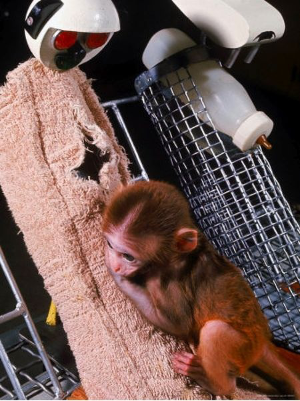Psychology Addict #1 | Raising confident, strong-minded children – What psychology tells us.
Contact-comfort & a secure-base.

It all begins at the very beginning. It really does! Babies who are born into an environment which provides them with loving, physical contact have their brains wired in a whole different way from those who do not have the same fortune. There is plenty of medical literature delivering overwhelming evidence for such notion. Take the infamous case of the late 80’s Romanian orphans, or even the astounding kangaroo mother care (the skin-contact approach that saves the lives of premature babies).
However, this knowledge has not always been agreed upon, quite the contrary. Names like Sigmund Freud and John B. Watson were amongst those who advocated parents to stand aloof from their children. In 1928 Watson went as far as stating ‘never hug and kiss your children, never let them sit in your lap. If you must, kiss them once on the forehead when they say goodnight’. Although psychoanalysts and behaviourist disagreed on what each other said, their argument for promoting such approach towards infants converged as they maintained that love would rather spoil the children as well as weakening them for the hardship of adult life. Freud, after all, stated that the only reason children were attached to their caregivers was because the latter readily met their basic biological necessities (feed them, burp them etc...).
Not only did John Bowlby disagree with it all but also made a little mock out of such notion calling the explanation given by the psychoanalysts and behaviourists ‘cupboard love’. Bowlby turned to ethological studies to make sense of the bond that rises between infants and their mothers. He, consequently, concluded that very much like in other animals the baby-mother relationship is a result of an innate predisposition - an evolved behaviour of an organism that promotes its success in survival and reproduction. This was, nonetheless, when his problems began. To prove the notion of Freud and Watson wrong, Bowlby found himself in need of strong evidence to support his findings. Then, Harry Harlow entered the picture.

Most interesting of all, perhaps, is the findings resulted from further experiments Harlow proceeded to conduct, the studies that found the importance a secure-base (someone they can count on) has for the healthy upbringing of children. The ethics of such experiments are most definitely questionable, and is very unlikely scientists would get away with similar procedures nowadays; still, there are those who prefer to look at the importance of the findings as they served as a body of evidence to change old attitudes and child-rearing policies. The study consisted of leaving a baby-monkey in a room full of toys. Here the infant animal’s behaviour was observed under two circumstances; one when he was left alone in the room, and two, when one of the mothers was present. It turned out that when left alone the baby monkey would just curl up in a frightened state and remained there; but, when in the presence of a mother, he would playfully explore the toys and the room whilst going back to the mother from time to time, or whenever he felt afraid. There are those who argue that the results gathered from studies conducted in nonhuman animals should not be fully applied to humans. Yet, when looking at the evolutionary scale a similar pattern of baby-parent bonding is present across species. Consequently, such behavioural patterns lead researchers to make inferences about human attachment.
It is widely known today that individuals with high E.I are more likely to endure life and obtain a more successful outcome. To raise confident, strong-minded children, therefore, an ambient filled with affection, happiness, and above all, understanding is paramount. This will build the foundations for the full, balanced development of the infant´s personality.
I love your summary of the research. My husband is almost finished with his PhD in this area and has a background in primate studies. The Harlow experiment was a key moment in both the human psychology and primate studies world. As we raise our own son, we have actively integrated much of this search into our own parenting. When you look at the history of the Romanian orphans, what is demonstrated is that environment truly can induce autistic and spectrum-like behaviors, just as nutrition can. This is not to say that there are not genetic factors that play into these disorders, but environmental impacts can encourage these genetic switches to turn on and in some cases induce behaviors that are otherwise genetically foreign to those individuals. It is important that we create environments that are supportive and neuro-protective, while encouraging growth and independence.
Hello Maloneap,
Your son is a very privileged child!
Attachment is one of the psychological theories that fascinates me the most! I am also very into Ainsworth´s work.
Primate studies are truly compelling, the insight we gather from them about our own species is simply invaluable (I have just recently watched a most fascinating documentary : Koko, the Gorilla that talks to people. I fell in love with her).
Thank you very much for your very informative comment. I watch with great curiosity and fascination science's transition from stating that genes are "the book of life" to understanding that rather they 'are servants, and not masters, of the development of form and individual differences' as Professor K. Richardson puts it.
The best of luck to your & your husband.
Abigail
Congratulations @abigail-dantes! You have completed some achievement on Steemit and have been rewarded with new badge(s) :
Click on any badge to view your own Board of Honnor on SteemitBoard.
For more information about SteemitBoard, click here
If you no longer want to receive notifications, reply to this comment with the word
STOPBy upvoting this notification, you can help all Steemit users. Learn how here!
Strong first article. I'm looking forward to seeing more :)
Thank you gktown! I will try to post something once a week! :)
As a psychology graduate, I'm looking forward to it :) I'd like to have a family of my own and hearing from someone with experience and a knack for psych is always welcome.
Congratulations @abigail-dantes! You have completed some achievement on Steemit and have been rewarded with new badge(s) :
Click on any badge to view your own Board of Honnor on SteemitBoard.
For more information about SteemitBoard, click here
If you no longer want to receive notifications, reply to this comment with the word
STOPBy upvoting this notification, you can help all Steemit users. Learn how here!
Yes ... to the point. Excellent. But can we rescue that poor little monkey please!
Yes! Let's do it :)
I enjoyed reading your post.
Thank you for your kind words @guideandgrace, they are very encouraging! I really appreciate when someone takes a few minutes of their time to read what I write! It makes me truly happy :))
Hi @abigail-dantes I enjoyed your article and will work my way through your series. the research you show is enlightening. I was wondering how this would mesh with other theories , such as Maslow's hierarchy of needs.